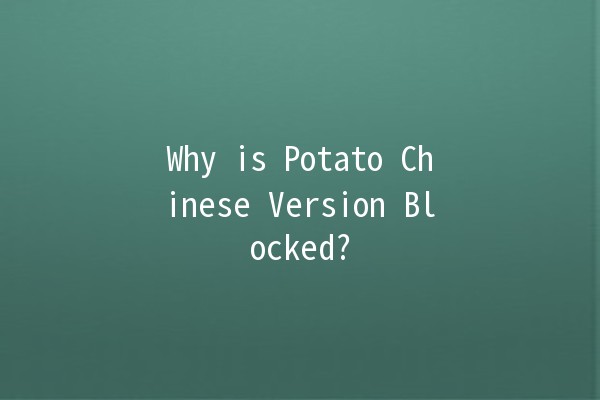In the vast landscape of internet services, users often encounter various platforms that provide different functionalities. One such platform is "Potato," a popular service that has garnered a significant following, especially in its Chinese version. However, users have recently reported that the Potato Chinese version has been blocked. This article delves into the reasons behind the blockage, the impact it has on users, and offers practical suggestions for overcoming this hurdle. Additionally, we will explore productivityenhancing tips that users can apply in their daily digital engagements.
Understanding the Blockage
The Chinese government has established strict regulations regarding internet services and applications. These regulations dictate that platforms must comply with local laws regarding content control and user data privacy. If Potato fails to meet these criteria or has content deemed inappropriate, it may face restrictions or outright blockage.
Example: A user attempting to access the Potato version might encounter a notification indicating that the service is unavailable due to compliance issues.

Many foreign platforms often require special licenses to operate within China. If Potato has not secured the necessary permissions or if there are disagreements over licensing agreements, the Chinese version may face closure.
Example: A startup may find its service suddenly terminated due to the absence of appropriate licensing, hindering its user base.
Potato may have faced issues regarding content moderation, specifically regarding usergenerated content. If harmful or inappropriate material is frequently reported, this could lead to the application being flagged and subsequently blocked.
Example: After multiple complaints about violence in a game hosted on Potato, regulatory bodies might decide to block the service entirely.
Exploring the Impact on Users
The blockage of Potato's Chinese version affects users significantly. It disrupts their access to essential services which may have been integrated into their daily digital lives. This disruption can lead to several consequences:
Effective Productivity Tips to Overcome Blockage Hurdles
Tip 1: Explore Alternative Platforms
While waiting for Potato to possibly reinstate its services, users can benefit from exploring alternative applications that offer similar functionalities.
Example: If you're using Potato for project management, consider apps like Trello or Asana which provide robust project tracking capabilities.
Tip 2: Utilize VPN Services
Using a VPN (Virtual Private Network) could allow users to bypass geographic restrictions and access blocked services.
Practical Application: A user may install a reputable VPN application, connect to a server in another country, and access the Potato platform as if they were in a different region.
Tip 3: Enhance Collaboration Tools
When a platform like Potato is unavailable, it's critical to boost existing collaboration tools like email and instant messaging.
Example: If team members previously communicated through Potato, switching to email summaries or utilizing Slack for realtime discussions can maintain workflow continuity.
Tip 4: Focus on Offline Productivity
Encouraging offline productivity can mitigate the disruption caused by the blockage.
Practical Application: Users can engage in brainstorming sessions, use physical planners, and prioritize facetoface meetings until online services are restored.
Tip 5: Stay Informed
Maintaining awareness of developments regarding Potato’s situation can help users prepare for the reestablishment of the platform.
Example: Following tech news outlets or forums can keep users updated on when Potato might resume services and any changes they should expect.
Common Questions Regarding the Blockage of Potato's Chinese Version
The blockage could be due to multiple factors, including government regulations, licensing issues, and content moderation failures. Each of these issues points to noncompliance with local laws or failure to meet content standards.
Yes, users can consider using Virtual Private Networks (VPNs) to bypass regional restrictions. Additionally, exploring alternative apps that provide similar functionalities can be a viable option.
Depending on the specific features utilized in Potato, users may look into platforms like Trello, Asana, Discord, or Zoom, which offer project management and communication functionalities.
Businesses may experience disruptions in communication and project management, leading to decreased productivity and potential delays in project timelines.
Users can follow technology blogs, forums, and official Potato news channels for the latest updates regarding the blockage and potential reinstatement of services.
The ability for Potato to resume operations in China depends on whether it can comply with government regulations, secure necessary licenses, and improve its content moderation practices.
The blockage of Potato’s Chinese version has significant implications for users who have come to rely on its services. By exploring alternative platforms, utilizing VPNs, and enhancing collaboration through existing tools, users can navigate this challenge effectively. Ultimately, staying informed about the situation will become a crucial aspect of continuing productivity in a rapidly changing digital landscape.